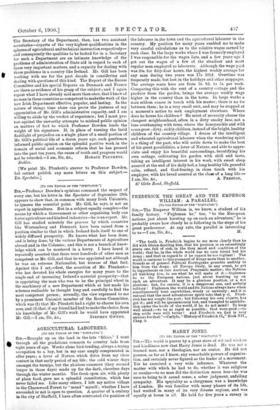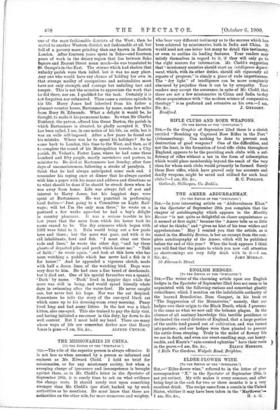HARRY JONES.
(To TFIE EDITOR OF THE " SPECTAT'OR.") SIR,—The world is poorer by a great store of wit and wisdom and kindliness now that Harry Jones is dead. He was not a learned man, nor a theologian, nor an orator. He did not possess, as far as I know, any remarkable powers of organisa- tion, and certainly never figured as the leader of a movement. Yet he exercised a very wide influence. Whatever the matter with which he had to do, whether it was religious or secular—to no man did the distinction mean less—he was
• sure to bring to it sound sense, a sober judgment, unfailing sympathy. His speciality as a clergyman was a knowledge of London. He was familiar with many phases of its life, had worked 'in many of its very diverse regions, and was equally at borne in all. He held for five years a curacy in
• one of the most fashionable districts of the West; then he moved to another Western district, not fashionable at all, but full of a poverty more grinding than any known in Eastern London. After fourteen years spent in Soho—and fourteen years of work in the dreary region that lies between Soho Square and Regent Street mean much—he was translated to $t. George's-in-the-East. The storms which had shaken that unlucky parish were then lulled, but it was no easy place. Any one who would have any chance of holding his own in that strange medley of occupations and nationalities must have not only strength and courage but unfailing tact and temper. This is not the occasion to appreciate the work that he did there, nor am I qualified for the task. Certainly it is not forgotten nor exhausted. Then came a curious episode in his life. Harry Jones had inherited from his father a pleasant country house, Bartonmere by name, some few miles from Bury St. Edmunds. What a delight it would be, he thought, to make it his permanent home. So when Sir Charles Bunbtiry, the patron, offered him Great Barton, the parish in which Bartonmere is situated, he gladly accepted it. This has been called, I see, in one notice of his life, an exile, but it was an exile self-imposed. After a few years he found out his mistake. Where was he to spend his holidays ? So he came back to London, this time to the West, and then, as if to complete the round of his Metropolitan travels, to a City parish, St. Vedast's, Foster Lane, where he had some three hundred and fifty people, mostly caretakers and porters, to minister to. He died at Bartonmere last Sunday, after four days of unconsciousness, following a stroke of paralysis. I think that he had always anticipated some such end. I remember his saying once at dinner that he always carried with him a paper with his name and address and directions as to what should be done if he should be struck down when he was away from home. Life was always full of zest and interest to Harry Jones, but his happiest days were spent at Bartonmare. He was punctual in performing local duties—" Just going to a Committee on Light Rail- ways ; will bet I'm the only man there," he wrote on a postcard a few 'weeks ago—but he had a boy's delight in country pleasures. It was a serious trouble in his last years that the mere from which his house took its name ceased to be. The dry summers which began with 1893 were fatal to it. Rain would bring out a few pools here and there ; but - the mere was gone, and with it its old inhabitants, fowl and fish. "I muat clear out these rods and lines," he wrote the other day, "and lay these ghosts of departed pike and perch which haunt me." "Talk of faith!" he wrote again, "and look at this hern who has been watching a puddle which has never had a fish in it for hours!" And he appended a vigorous sketch, made with half a dozen lines, of the watching bird. Dogs were very dear to him. He had once a fine breed of deerhounds, but it died out. One of his special favourites was a spaniel,. 'Dash' by name. 'Dash' lived in happier days while the mere was still in being, and would spend literally whole days in swimming after the water-fowl. He never caught one, but never lost his hope. Nor was the cat despised. Somewhere he tells the story of the one-eyed black cat which came up to his dressing-room every morning. Pussy lived long and had many litters. In the last was a black kitten, also one-eyed. This she trained to pay the daily visit, and having initiated a successor in this duty, lay down to die well content. But I must hold my hand. There are many whose ways of life are somewhat darker now that Harry Tones is gone.—I am, Sir, &c., ALFRED CHURCH.



















































 Previous page
Previous page